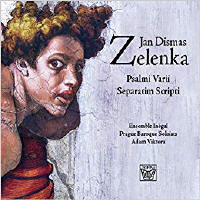Texte paru dans: / Appeared in: Nibiru |
|
|
Reviewer: Bertil
van Boer
This is the third disc of the
collection of Vespers Psalms by Jan Dismas Zelenka, all of which were
gathered as part of cycle of these works by the composer himself about 1735
or so. As noted elsewhere in this issue (Psalmi Vespertini I), these works
were part of a compendium that he created during his years as Kapellmeister
at the Catholic Marienkirche in Dresden. He began his Inventarium of music
in 1726, perhaps as a means of remembering his almost frenetic creativity as
a composer of sacred music since his days in Bohemia. Herein he entered
works in a continuous stream, eventually including some 30 Masses and many
Mass movements, three Lamentations, five Requiems, and almost 200 other
works of sacred music. This set of works, unlike those of the Psalmi
Vespertini, seems to have been a miscellaneous collection with no unifying
thread, and therefore it is unknown why he put them together, save that they
are meant for Vespers on Sunday.
Among the works on this disc
are four that are receiving their modern premieres. The first of these opens
the recording: the Lauda Jerusalem, with its swirling string accompaniment
and solid choral work, with just a hint of imitation. The second is the De
profundis clamavi, which is slow, sonorous, and with a lovely solemnity that
allows both the choral portions and the soloists to blend easily. This is
followed by the Dixit Dominus, a short choral explosion of full-bodied
orchestral and choral sound in which the voices are energetic and joyous
above a relentless walking bass. The fourth is a short chorus, Ecce nunc
benedicite, which is surprisingly modern, with good harmony and full
textures, as well as a brief interlude with the solo voices in a more strict
style.
For the remainder, one great
piece follows the next. The bouncy Laudate pueri has a duet between solo
clarino and tenor that is a bit Handelian right up to the point where both
are pushed to the extremes of their registers in the opening aria. This
demonstrates the high ability of Zelenka’s performers in Dresden. A lengthy
and quite pensive aria (Quis sicut Dominus) follows, in which the mood
alters abruptly and the walking bass provides a steady rhythmic foundation
above which the strings and tenor float lyrically. The “Amen” is, as one
might expect, is buoyant and free, with swirling trumpet lines intersecting
with the challenging coloratura of the tenor. Here, tenor Tobias Hunger
handles the difficult passages with considerable skill and ease. The two
settings of the Confitebor tibi Domine are quite different in musical
content. The first (ZWV 71) is more thoughtful, with the opening aria of the
two movements almost like it could have been written for a Bach oratorio,
while the second (Memoriam fecit) sounds like Telemann with its cantus
firmus bass solo above a rapidly running bass line and the ritornello
violins in unison. The second, a choral work (ZWV 73), is faster, with a
tune that sounds like it was based on a Czech folk song. Here all four vocal
soloists have their momentary commentary, but is the effusive choral
portions that stand out. The Laetatus sum is cantata-like in its multiple
movements, each of which paints a miniature musical portrait. The opening
seems like it could have been written by C. P. E. Bach, so galant is it in
the juxtaposition of duple and triple rhythms. Here one has a quavering
soprano and alto duet at the beginning, and in the second movement the music
turns Vivaldian with swirling string lines. The soprano reaches high into
her range, making her part more operatic. This piece concludes with the
doxology in two parts, the first suspensive and solemn, concluding with a
rollicking duet. The performance standards of this disc are universally excellent, as with the two others. The vocal soloists know their stuff in the particularly tortuous parts, and what is more is that they are in tune and handle the various coloratura with the same alacrity that also pervades the close harmonies elsewhere in slower sections. The chorus is smaller, but still has a large sound. Their diction is clear and precise, matching the wonderful ensemble playing of the Prague Baroque Soloists. These are clear, and the wonderfully rustic continuo, which is often forced to be both energetic and steady, cannot be beat. This is one fine disc and a fitting conclusion to the trilogy. It shows Zelenka to have well deserved his fine reputation as one of the best composers of the age.
| |
|
|
|
|
|
|
|
Cliquez l'un ou l'autre
bouton pour découvrir bien d'autres critiques de CD |
|




